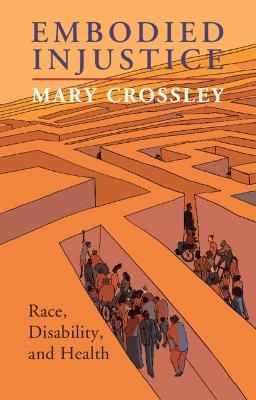
Embodied Injustice
Race, Disability, and Health
Seiten
2022
Cambridge University Press (Verlag)
978-1-108-83029-4 (ISBN)
Cambridge University Press (Verlag)
978-1-108-83029-4 (ISBN)
Health justice is central to social justice. The Eugenics movement, involuntary medical experimentation, restrictive Medicaid reforms, and the COVID-19 pandemic reveal health inequities endured by Black Americans and disabled Americans as part of a common fabric. This book supplies a foundation for coordinated advocacy to advance health justice.
Black people and people with disabilities in the United States are distinctively disadvantaged in their encounters with the health care system. These groups also share harsh histories of medical experimentation, eugenic sterilizations, and health care discrimination. Yet the similarities in inequities experienced by Black people and disabled people and the harms endured by people who are both Black and disabled have been largely unexplored. To fill this gap, Embodied Injustice uses an interdisciplinary approach, weaving health research with social science, critical approaches, and personal stories to portray the devastating effects of health injustice in America. Author Mary Crossley takes stock of the sometimes-vexed relationship between racial justice and disability rights advocates and interrogates how higher disability prevalence among Black Americans reflects unjust social structures. By suggesting reforms to advance health equity for disabled people, Black people, and disabled Black people, this book lays a crucial foundation for intersectional, cross-movement advocacy to advance health justice in America.
Black people and people with disabilities in the United States are distinctively disadvantaged in their encounters with the health care system. These groups also share harsh histories of medical experimentation, eugenic sterilizations, and health care discrimination. Yet the similarities in inequities experienced by Black people and disabled people and the harms endured by people who are both Black and disabled have been largely unexplored. To fill this gap, Embodied Injustice uses an interdisciplinary approach, weaving health research with social science, critical approaches, and personal stories to portray the devastating effects of health injustice in America. Author Mary Crossley takes stock of the sometimes-vexed relationship between racial justice and disability rights advocates and interrogates how higher disability prevalence among Black Americans reflects unjust social structures. By suggesting reforms to advance health equity for disabled people, Black people, and disabled Black people, this book lays a crucial foundation for intersectional, cross-movement advocacy to advance health justice in America.
Mary Crossley is a Professor of Law and John E. Murray Faculty Scholar at the University of Pittsburgh School of Law. She is a member of the Pennsylvania State Advisory Committee to the U.S. Commission on Civil Rights and is widely published on health-related inequity.
1. Introduction; 2. Health Disparities Based on Race and Disability; 3. Biology's (In)significance; 4. Medical Mistrust: Its Roots and Some Fruits; 5. Maligned Mothers; 6. Medicaid Preservation: A Shared Priority; 7. Beyond Health Care: Social Determinants; 8. COVID Stories; 9. The Busy, Troubled Intersection of Blackness and Disability; 10. Conclusion: The Payoff for Health Justice; Index.
| Erscheinungsdatum | 16.08.2022 |
|---|---|
| Zusatzinfo | Worked examples or Exercises |
| Verlagsort | Cambridge |
| Sprache | englisch |
| Maße | 157 x 235 mm |
| Gewicht | 520 g |
| Themenwelt | Recht / Steuern ► EU / Internationales Recht |
| Recht / Steuern ► Privatrecht / Bürgerliches Recht ► Medizinrecht | |
| Sozialwissenschaften ► Politik / Verwaltung ► Staat / Verwaltung | |
| ISBN-10 | 1-108-83029-3 / 1108830293 |
| ISBN-13 | 978-1-108-83029-4 / 9781108830294 |
| Zustand | Neuware |
| Informationen gemäß Produktsicherheitsverordnung (GPSR) | |
| Haben Sie eine Frage zum Produkt? |
Mehr entdecken
aus dem Bereich
aus dem Bereich
Vorschriftensammlung
Buch | Softcover (2024)
C.F. Müller (Verlag)
55,00 €


